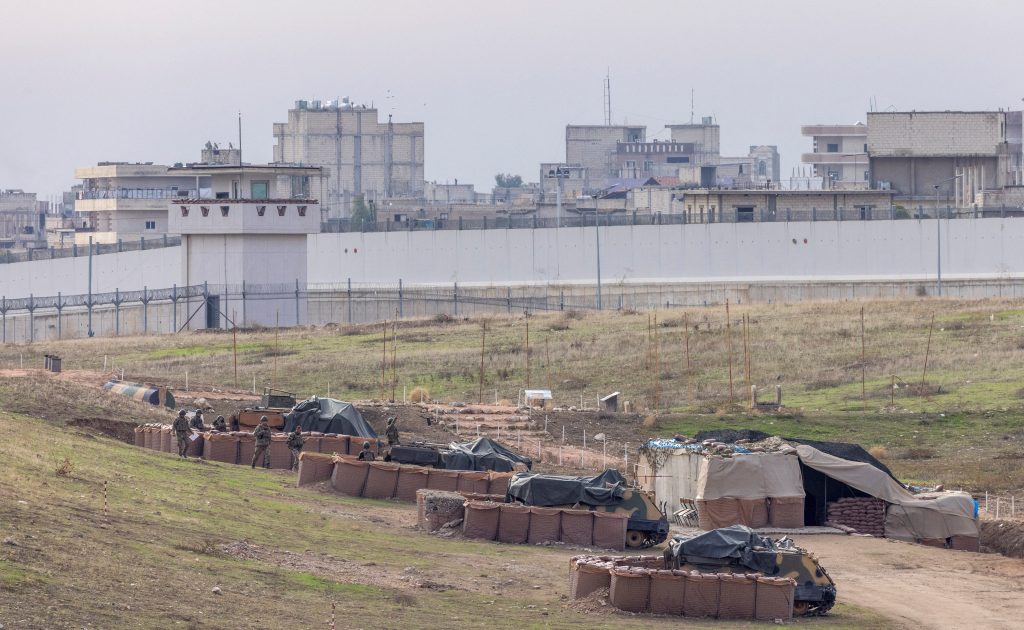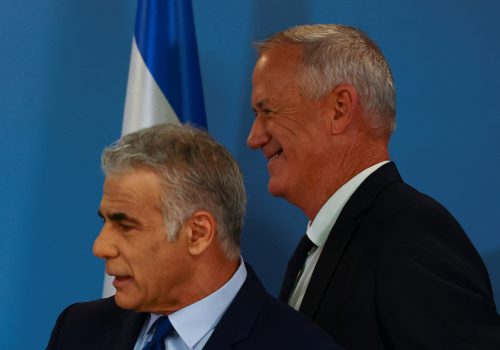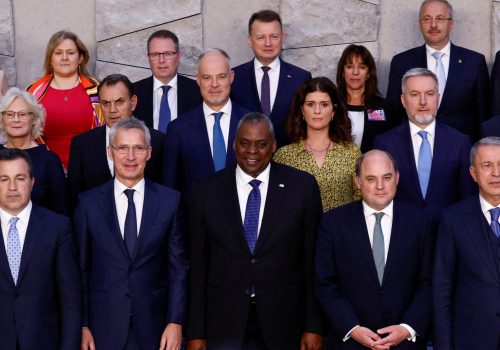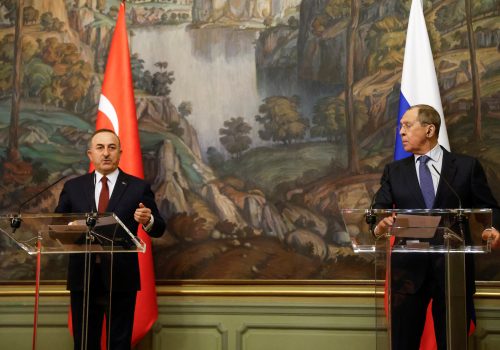Turkish President Recep Tayyip Erdogan has signaled his intent to soon launch the ground phase of Operation Claw-Sword, a military operation designed to clear areas along Turkey’s southern borders of fighters from affiliates of the Kurdistan Workers’ Party or PKK, which the United States lists as a terrorist organization.
A major new operation has been referenced by Erdogan since at least June of this year, but he has consistently emphasized that the timing will be of his choosing: “suddenly in the middle of the night.” Preparations for the ground operation appear nearly complete, so the clock could strike proverbial midnight within days.
The new escalation was prompted by a deadly November 13 bombing on Istanbul’s iconic and crowded Istiklal street that killed six people. Turkey has carried out arrests and interrogations identifying the bomber and her support network, and has detailed alleged ties to the PKK’s Syrian branch, the so-called People’s Defense Units or YPG. PKK affiliates including the YPG have conducted attacks in Turkey and against Turkish targets in Syria both before and since the beginning of Claw-Sword, so in Ankara’s view the particulars of the bombing are secondary. More important is Erdogan’s commitment to removing the YPG from within thirty kilometers (18.6 miles) of the Turkish border, at least west of the Euphrates River. This likely means an operation against Tel Rifaat and Manbij, areas jointly controlled by the YPG and forces of Syrian President Bashar al Assad’s regime, from which Turkish forces and their Syrian National Army partners have been attacked.
The prospective operation may be causing heartburn in Washington, but it could present an opportunity for the United States and Turkey to find an elusive end game to the Syria conflict—if they can overcome their mistrust.
Where Claw-Sword fits
Claw-Sword is the latest in a decades-long series of anti-PKK operations in northern Iraq and Syria. Since its launch on November 20, it has consisted mostly of sustained air and artillery strikes, with manned and unmanned (drone) aircraft in the lead. Expectations of a ground operation have prompted urgent outreach from Washington and Moscow to prevent or limit the scope of the ground offensive, but Turkish official statements and past operations leave little doubt that it will occur.
Ankara’s motive in Claw-Sword entails revenge for the November 13 Istiklal attack, but it ultimately focuses on completing a “safe zone” to remove PKK-aligned forces from sensitive border areas, enable refugee returns, and ensure Turkish influence over eventual political arrangements to end the war in Syria. With the YPG out of Manbij and Tel Rifaat, the group’s post-2015 territorial gains in predominantly Arab northwest Syria—which the Turks believe were enabled by the West—will be reversed. The coalition of anti-Erdogan political opposition parties (the “Table of Six”) has signaled support for military action to secure the border areas, while Turkish public opinion has generally backed cross-border operations against the PKK.
Neither the United States nor Russia is positioned to stop a ground operation from beginning, though they will doubtless apply pressure to end it once it does. Both countries’ intelligence chiefs were likely briefed during recent visits to Ankara, and the betting line in Ankara is that ground operations west of the Euphrates will be tacitly tolerated if modest in scope and careful in execution. This might be the last ground operation Ankara views as necessary to declare success in establishing its “safe zone” in northern Syria. Ground operations will almost certainly avoid Kobane, east of the Euphrates, for a number of reasons: Its population is overwhelmingly Kurdish and generally pro-PKK, it would be far more daunting to seize or administer, and it abuts areas where US forces are conducting counter-Islamic State of Iraq and al-Sham (ISIS) operations in northeast Syria.
Why now, what after?
A number of considerations beyond the Istiklal attack likely have informed the timing of Claw-Sword. The short list includes:
- The war in Ukraine has bolstered Turkey’s diplomatic leverage, weakened Russia’s military credibility and resources, and made multilateral pressure far less plausible.
- Regional diplomatic rapprochement has reduced the number of neighboring countries inclined to vigorously oppose Turkish anti-PKK operations.
- Escalating Iranian provocations against US forces and interests in Iraq and Syria cast Turkey’s role in those countries in a different light. The United States is increasingly likely to need Turkish cooperation to achieve counterterrorism goals and other regional aims in the coming years, including the protection of Iraq’s Kurdistan region from Iranian subversion.
- Turkish elections are scheduled for June 2023, and Erdogan’s Justice and Development Party has an imperative to fulfill its pledges related to Turkish interests in Syria.
Turkish ground operations may prompt calls in Washington to protect the current status quo in northeast Syria through threats and sanctions, such as invoking provisions of 2019’s Executive Order 13894 to block the assets of Turkish officials and ministries. But such threats have not deterred Turkish operations in the past, though they may hasten the conclusion of specific operations.
Sanctions run the risk of ramping up nationalist and anti-US sentiments in Turkey or imperiling other Western interests related to Ukraine, Iran, and NATO enlargement. It is unlikely that Washington, or other Western capitals, will enter that sort of leverage game over a ground operation that has been signaled, delimited, and meticulously prepared.
The US military remains in Syria explicitly to suppress the remnants of ISIS and implicitly to deter the expansion of malign Iranian activities. Turkish ground operations may prompt the YPG to suspend cooperation against ISIS, but this would likely be temporary as such operations are the sine qua non of US support to the Syrian Democratic Forces (SDF), of which the YPG is the primary component. As during the last major Turkish operation in northern Syria—Operation Peace Spring in 2019—Ankara will likely maintain clear limits on the scope of its ground operation and scrupulously avoid areas near US troops in order to firewall Turkey’s war against the PKK in Syria from the campaign by the United States and SDF against ISIS remnants. The latter may be interrupted, but will likely resume after a short delay.
Ankara and Washington have been talking past one another on northern Syria since the United States aligned with the YPG in late 2014, but in the wake of the coming operation, there may be a fleeting opportunity to address a mutually acceptable end game to the Syrian conflict.
Erdogan has contemplated re-establishing relations with Assad, though he is unlikely to make any deals that do not protect the Syrian opposition and Turkish security interests. Washington, for its part, seems to have accepted the proposition that Assad will likely remain in power, though he must be pressured into acceptable treatment of his country and people in post-conflict arrangements.
The two players with the strongest cards to extract concessions from Assad are Turkey and the United States; the obstacle to their collaboration is Turkish concern over the presence of the YPG near its border. A carefully controlled and delimited operation may reduce the Turkish threat perception without fatally wounding either the SDF or the campaign against ISIS.
Neither side benefits from the current chasm on Syria policy, and if the ground operation is unavoidable, the possibility remains that its swift conclusion might lead to more serious attempts at forging a common approach. That may be overly optimistic given the deep mutual mistrust and misaligned priorities, but the alternative—continued division that leads to separate bad deals in the Syrian end game—is worse.
Rich Outzen is a geopolitical consultant and nonresident senior fellow at the Atlantic Council IN TURKEY with thirty-two years of government service both in uniform and as a civilian. Follow him on Twitter @RichOutzen.
Further reading
Thu, Nov 10, 2022
With an eye on Iran, Turkish-Israeli relations will deepen
TURKEYSource By Pınar Dost
Driven by strong regional imperatives, Turkey-Israel relations are warming quickly. After a decade long rift, the two countries have many areas to benefit from cooperation.
Fri, Jun 24, 2022
Turkey and NATO are stronger with each other. They must de-thorn their relationship.
New Atlanticist By
Irritants that have weighed down the relationship between Ankara and its allies must be addressed sooner than later.
Tue, Jun 7, 2022
With Lavrov in Turkey, a different war may dominate talks
TURKEYSource By Rich Outzen
The Russian and Turkish foreign ministers could discuss Ankara's intent to carry out a new operation against Kurdish forces in northern Syria.
Image: Turkish army vehicles are positioned at a military post as Syrian border town of Jarablus is seen behind the Turkish-Syrian border line in Karkamis in Gaziantep province, Turkey, November 29, 2022. REUTERS/Umit Bektas



